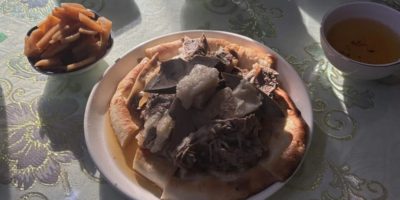By Drew Halfnight
I remember the first time I heard the word “runt.”
The puppy was distraught, discouraged, unable to penetrate the swarm of dog bodies competing for a nursing position at mother’s belly.
My mother and the breeder stood in the kitchen, commiserating about the runt, no bigger than a butternut squash and weaker than the others.
The breeder offered a $100 discount. My mother said she might take her, out of pity, but in the end paid premium for a healthier pup.
In my mom’s litter of four, I was the last born. And as the last born, scientific studies would have me statistically shorter, thinner, dumber, crazier, poorer, more self-destructive and less educated than my first-born brother Ashlin.
Those stats are said to be the result of the relative allotment of parental resources – food, money, attention, love – which, in my family’s case, came undivided to Ashlin, halved to my brother Chris, three ways to my sister Erin, and which were always rationed to me in quarters.
It’s true that as the lowest-ranking child, I fantasized about regime change. I wanted to blow up our oppressive family hierarchy and replace it with perfect egalitarianism.
And in this sense, I might just qualify as a textbook runt.
Research on birth order dates from at least 1874, when Francis Galton published English Men of Science: Their Nature and Nurture, examining the lives of 180 “eminent men” and found that 48 per cent of them were first-borns.
A rash of studies in the 1970s and ’80s turned up new findings that seemed to confirm the idea that first borns were destined to be alphas. They were disproportionately represented in a whole range of skill sets and status groups, including Nobel Prize winners, classical composers, CEOs and presidents.
Cross-sectional studies even found that IQ decreases by one point each rung down the birth ladder.
When birth-order psychologist James Sulloway said, “In many families, the first born is going to get into Harvard and the second-born isn’t,” he was being facetious.
But in my family, that’s how it happened.
My brother Ashlin did more than just get into Harvard. He also graduated with honours, then won a Fullbright Scholarship while earning a second degree from Columbia.
He played pro hockey and published a play too, the bastard.
He was a tough act to follow, especially for a runt. But my other siblings and I displayed remarkable ingenuity in our efforts to keep Ashlin in check. Humour was our number one weapon. Whenever he got too domineering, we made sure to knock him down a peg.
Another strategy we used was “de-identification,” whereby younger siblings take up roles that distinguish them against the first born.
This was my brother Chris’s specialty. As Ashlin excelled at sports, Chris quit them. While Ashlin developed mainstream taste in clothes and music, Chris got into drugs and drinking. Ashlin was boisterous and crude, and Chris became the quiet, sensitive intellect.
Despite a seven-year age difference, or perhaps because of it, Ashlin and I were just as affected by the pecking order.
During this past Christmas dinner, we were arguing wildly about something. I was intent on making some point, but he raised his voice to cut me off. I continued and raised mine louder. He leaned in and let rip, slurring his words together to drown me out.
Louder and louder we hollered into each other’s faces, looking more and more like a pair of howler monkeys I’m sure, our voices crescendoing in an unintelligible blast of caveman aggression, both of us refusing to back down.
Before long I had clambered onto the table, inspired by too much wine and the thrill of confronting the bastard, pointing my finger down at him, triumphant, my head bumping the ceiling.
For once, I was thinking, I won’t let you stand over me.
But for the last-borns, it’s not all weak knees, envy and sabotage.
On the plus side, studies have found that we runts are on average more creative, more intuitive, more entertaining, funnier, and coolest of all, more prone to life-threatening and “exhilarating” professions.
I once got marooned on a rocky outcropping in Corsica in only my skivvies after trying to swim to an unmanned motor boat that was floating by about 100 feet out in the Mediterranean. And I was drunk.
The need to find creative ways to distinguish themselves leads last-borns to the exotic edges of behaviour and experience.
Last summer, I volunteered to accompany individuals vulnerable to human-rights abuses in Guatemala.
One study showed last-borns were overrepresented in protest arrests.
While I’ve never been jailed, I chose a career in journalism partly to challenge authority and expose abuses of power.
So I take pride in my runthood. Yes, I may at times begrudge my siblings their larger share of momma’s milk. But them’s the brakes in the birth order-game: never enough teats to go around.











Leave a Reply